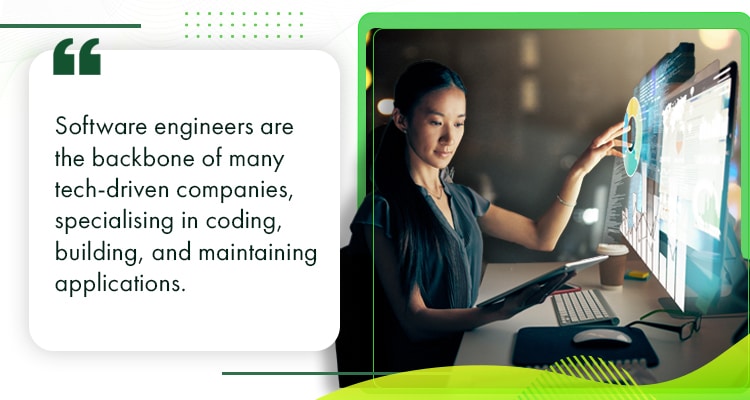Hiring the right tech talent can make or break a business – especially in the digital age, yet many companies still struggle with inefficient interview processes.
In fact, research from Harvard Business Review shows that traditional hiring approaches often miss the mark, with bad hires costing businesses up to five times the employee’s annual salary.
This is especially critical in tech interviews, where evaluating both technical skills and cultural fit is essential.
Whether it’s coding interviews or behavioural assessments, a structured and well-thought-out interview process is key to avoiding costly mistakes – and to finally landing a valuable member of the team who can take your business to new heights.
Keep reading to learn more about the proven strategies and interview tips for hiring tech talent effectively.
From coding assessments to interview tools, discover how to streamline your interview process and increase your chances of hiring the right candidates.
Common Tech Roles Most Businesses Hire For
When it comes to building a strong tech team, understanding the specific roles your business needs is essential.
Each position comes with its own set of technical and practical skills, which must be evaluated during the interview process to make sure you are bringing in the right talent.
Let’s break down some of the most in-demand tech roles and how they contribute to a business’s success.
Software Engineer/Developer
Software engineers are the backbone of many tech-driven companies, specialising in coding, building, and maintaining applications.
They commonly work with languages like Java, Python, and JavaScript.
These professionals are important for companies that need to develop scalable, secure, and efficient software solutions.
Global tech giant Atlassian, based in Australia, relies heavily on software engineers to develop its flagship products like Jira and Confluence.

These engineers contribute to Atlassian’s ability to innovate and maintain a competitive edge in the software market.
Frontend Developer
Frontend Developers focus on creating engaging and functional user interfaces, making sure that websites and applications are both visually appealing and easy to use.
They work with web technologies such as HTML, CSS, and JavaScript to design the look and feel of digital products.
Their team works on creating a seamless shopping interface that drives customer satisfaction and engagement.
Backend Developer
Backend Developers manage the server-side logic and databases that drive web applications.
They typically work with programming languages like Python, Ruby, and Java, along with databases such as MySQL, making the infrastructure of web applications robust and efficient.
US-based streaming service Netflix employs backend developers to handle the complex data processing required for video streaming, user management, and content recommendations.
Their work guarantees smooth, reliable performance for millions of users globally.
Full Stack Developer
Full stack developers are versatile professionals who can manage both the frontend and backend aspects of a web application.
They are skilled in a wide range of technologies, making them an asset to any company that needs flexible, all-around development expertise.
Australian financial technology company Afterpay benefits from full stack developers who can manage everything from the customer-facing website to the back-end payment processing systems.
This role is essential for a seamless customer experience and effective transaction handling.
DevOps Engineer
DevOps engineers work at the critical intersection of software development and IT operations for seamless collaboration between the two.
They focus on automating tasks like deployment, scaling, and monitoring software applications, making it easier for companies to release and manage updates efficiently.
DevOps plays a key role in maintaining system reliability and scalability, especially for organisations handling large-scale software products or platforms.
Australian software company Canva, for instance, relies on DevOps engineers to manage and automate the deployment of their design platform.
These engineers help Canva scale its services to millions of users globally for smooth performance and quick rollouts of new features.
Data Scientist/Analyst
Data scientists and analysts are key to making data-driven decisions within an organisation.
They analyse large datasets to uncover insights, inform business strategies, and improve processes.
These professionals are often familiar with Python, SQL, and machine learning models, which enable them to extract value from vast amounts of data and guide business decisions.
Global online retailer Amazon employs data scientists to analyse customer behaviour, optimise pricing strategies, and improve product recommendations.
This data-driven approach helps Amazon maintain its dominance in e-commerce by constantly refining the customer experience based on actionable insights.
System Administrator
System administrators are responsible for managing and maintaining a company’s IT infrastructure so systems run efficiently and securely.
They handle tasks such as setting up servers, managing databases, and making sure security protocols are in place.
This role is vital in preventing downtime and maintaining cybersecurity for the smooth operation of internal and external systems.
Australian airline Qantas relies on system administrators to manage its extensive IT infrastructure, from ticketing systems to customer data storage.
These professionals make sure that the airline’s IT systems are always running smoothly, supporting millions of customers and employees daily.
UX/UI Designer
UX/UI Designers focus on the user experience so that applications are both functional and visually appealing.
They work closely with developers to create intuitive designs that align with the needs of users while enhancing the aesthetic appeal of the product.
These designers play an important role in the overall success of any tech product, as user experience directly impacts customer satisfaction and retention.
These designers work on everything from the mobile app interface to the desktop version for a consistent and user-friendly experience across platforms.
Identifying Hiring Needs
Once you’ve identified the key tech roles required for your business, the next step is determining the specific hiring needs for each position.
It is important to thoroughly define both the technical and soft skills necessary for the role, as well as establish clear role expectations and how the candidate will fit within your existing team.

By doing so, you’ll be in a better position to conduct effective tech interviews that assess both skill sets and cultural alignment.
Technical and soft skills required for the role.
When hiring for any tech position, it is important to evaluate both the technical and soft skills a candidate brings to the table.
Here’s what to consider:
- Proficiency in relevant programming languages like Python and Java
- Experience with necessary tools and technologies such as Git, Docker, and Jenkins
- Problem-solving abilities to handle complex technical challenges
- Communication skills to collaborate effectively with team members and stakeholders
- Adaptability to work in a fast-paced, ever-changing tech environment
- Critical thinking for making data-driven decisions
- Teamwork and the ability to collaborate within a cross-functional team
Defining role expectations and team fit.
Clearly defining what the role entails and how a candidate will integrate with your team is just as important as technical competence.
Be specific about your expectations by addressing the following:
- Job responsibilities that align with both short-term and long-term business goals
- Daily tasks and deliverables the candidate will be expected to handle
- Collaborative skills required to work across departments or with non-tech teams
- Alignment with company culture to foster a positive work environment
- Growth potential and how the role might evolve over time
- Leadership and mentoring abilities if applicable to the role
By outlining both technical requirements and team dynamics upfront, you’ll create a more structured and effective interview process that attracts candidates with the right mix of skills.
Preparing the Interview Process
Once you’ve clearly defined the role requirements and expectations, it is time to develop the structure of the interview process itself.
A well-prepared interview strategy is essential to evaluate both technical and soft skills effectively.
This involves crafting a comprehensive interview plan and selecting the right format that suits the specific tech role you are hiring for.
Crafting an interview plan.
Before you begin interviewing candidates, it is important to have a clear plan in place to guide the process.

A well-organised interview plan will help you assess candidates methodically and make better informed hiring decisions. Key steps include:
- Developing a list of core skills to assess based on the job requirements (both technical and soft skills)
- Creating a standardised set of interview questions to evaluate each candidate consistently
- Assigning interview stages such as initial screening, technical evaluation, and cultural fit assessment
- Involving the right team members in the interview process to provide diverse perspectives
- Allocating time for follow-up questions and discussions to delve deeper into key areas
Choosing the right interview format.
Selecting the right interview format is important to assess the practical skills of tech candidates, while also evaluating how they will fit within your team.
The format should be tailored to the complexity of the role and the level of interaction required. Consider the following formats:
- Phone screens for initial conversations to gauge interest and basic qualifications
- In-person or video interviews for a deeper discussion of the candidate’s experience and cultural fit
- Coding tests to evaluate the candidate’s technical proficiency in real-world scenarios
- Behavioural interviews to assess problem-solving abilities, teamwork, and communication skills
- Take-home coding assignments to determine how candidates perform remotely and within a set deadline
- Technical presentations or whiteboard exercises for roles that require explaining complex ideas or systems clearly
By carefully crafting your interview plan and choosing the appropriate format, you’ll be in a strong position to evaluate tech candidates comprehensively.
Creating Effective Technical Questions
Once the interview format has been chosen, the next critical step is to create meaningful technical questions that will accurately assess a candidate’s abilities.
These questions should be designed to evaluate both their coding proficiency and problem-solving skills, while also providing insight into their theoretical knowledge and practical application.
Balancing these elements will help you hire tech talent who can thrive in real-world scenarios.
Formulating relevant coding and problem-solving questions.
To effectively evaluate a candidate’s technical skills, it is important to ask questions that test their coding abilities and how they approach solving complex problems.
Here are some key considerations when formulating questions:
- Focus on real-world coding problems that accurately reflect the tasks candidates will handle in the role.
- Incorporate data structures and algorithms to assess their understanding of fundamental concepts.
- Use open-ended problem-solving questions to evaluate their critical thinking and creativity in approaching challenges.
- Ask questions related to specific technologies or frameworks relevant to your tech stack such as Python, Java, or AWS.
- Include optimisation challenges to gauge how well candidates can improve code efficiency and performance.
- Test debugging skills by presenting broken code and asking candidates to identify and fix issues.
Balancing theory and practical skills.
While it is important to assess a candidate’s practical coding abilities, evaluating their theoretical knowledge is equally vital.
A balanced approach allows you to determine if the candidate understands the underlying principles that drive their coding decisions.
Consider these strategies to strike the right balance:
- Ask foundational theory questions related to algorithms, software architecture, and design patterns to evaluate depth of knowledge.
- Incorporate practical coding challenges that require candidates to apply theoretical concepts to real-world scenarios.
- Evaluate their knowledge of best practices in coding, such as writing clean, up-to-date code and following security protocols.
- Discuss software development lifecycle principles to understand their approach to development, testing, and deployment.
- Ask about past experiences where they had to make design decisions, showcasing their ability to apply theory in practice.
By combining relevant coding questions with theoretical inquiries, you’ll gain a holistic view of a candidate’s technical strengths.
Conducting Behavioural Interviews
After evaluating a candidate’s technical skills, it is crucial to assess their problem-solving abilities and communication skills through behavioural interviews.
This interview phase helps identify whether the candidate has the soft skills necessary to work effectively within your team, collaborate on projects, and handle challenges that may arise.
By asking the right questions, you can get a sense of how the candidate approaches real-world problems and interacts with others.
Importance of assessing problem-solving and communication skills.
A behavioural interview allows you to evaluate how a candidate will function in a dynamic work environment.
Focus on assessing their ability to solve problems under pressure, communicate effectively with team members, and adapt to changing situations.
Key areas to assess include:
- Problem-solving techniques used in past projects or situations
- Communication style when discussing complex ideas with non-technical stakeholders
- Ability to collaborate and work in a team environment on cross-functional projects
- Handling feedback and learning from mistakes or challenges
- Decision-making processes for navigating high-pressure situations
Key behavioural questions to ask.
To get a clearer picture of a candidate’s interpersonal skills, ask questions that delve into their past experiences and behaviour in various scenarios.
Consider asking questions to evaluate how they’ve handled both success and setbacks:
- “Tell me about a time when you faced a difficult problem at work. What was your approach to solving it?”
- “Describe a situation where you had to explain a technical concept to a non-technical person. How did you manage it?”
- “Give an example of a project where you had to collaborate closely with other departments. What challenges did you encounter and how did you get past them?”
- “Can you share a time when you received constructive feedback? How did you respond?”
- “Talk about a situation where a project didn’t go as planned. How did you adjust your approach?”
Assessing Problem-Solving Skills
Assessing how they approach coding challenges and algorithm testing will give you insight into their critical thinking, logical reasoning, and ability to write efficient code.
Coding challenges and algorithm testing.
To accurately measure a candidate’s problem-solving skills, you need to present them with coding challenges that mimic real-world situations.
These tests reveal how well the candidate can apply their knowledge under pressure and within given constraints.
Some key elements to consider include:
- Presenting a complex coding problem that requires algorithmic thinking to solve
- Asking the candidate to optimise a piece of code for efficiency
- Testing their understanding of common data structures such as arrays, trees, and hash maps
- Evaluating their ability to break down a large problem into smaller, manageable parts
- Introducing time or resource constraints to simulate real-world scenarios
Evaluating clean code, scalability, and efficiency.
The quality of the code a candidate writes is just as important as their ability to solve problems.
Clean, scalable, and efficient code contributes to the overall success of a project.
Here are some key factors to look for when assessing code quality:
- Cleanliness of the code (Is it readable, well-organised, and easy to maintain?)
- Scalability (Can the code handle increased data loads or traffic without compromising performance?)
- Efficiency (Is the code optimised to run with minimal resource usage?)
- Use of best practices (Does the candidate follow established coding conventions and design patterns?)
- Error handling (How well does the code manage unexpected inputs or edge cases?)
By thoroughly assessing both behavioural and technical skills, you’ll have a much better chance at hiring tech talent who don’t just excel at coding but would also fit well within your company’s culture.
Using Tech Interview Tools
Once you’ve established a solid interview structure, leveraging the right tech interview tools can greatly enhance the efficiency and accuracy of your hiring process.
These tools allow you to assess candidates’ coding skills and problem-solving abilities in real-time, providing deeper insights into their qualifications.
Understanding the benefits and limitations of these tools will help you make the right decision when selecting the best platform for your tech hiring needs.
Overview of popular coding platforms.
There are several popular coding platforms available to help you evaluate technical skills during tech interviews.
These platforms provide interactive environments for candidates to solve coding challenges while you assess their thought processes and technical abilities.
Some widely-used options include:
- HackerRank. A platform that allows you to create custom coding challenges, with support for various programming languages.
- LeetCode. Known for its wide range of algorithmic problems, perfect for testing problem-solving skills.
- CodeSignal. Offers a mix of technical assessments and live coding interview to evaluate real-world skills.
- Codility. Focuses on remote coding challenges and provides reports to gauge a candidate’s proficiency.
Pros and cons of automated interview tools.
Automated interview tools can save time and streamline the evaluation process, but they also come with their own set of challenges.
Here’s what to consider when incorporating these tools:
Pros:
- Time-efficient. Automates the initial stages of coding assessment, reducing time spent on manual evaluations.
- Scalability. Easily evaluates large numbers of candidates, especially helpful for high-volume tech hiring.
- Objectivity. Standardised assessments reduce potential biases in the initial screening process.
Cons:
- Lack of personalisation. May not fully capture a candidate’s unique problem-solving approach or creativity.
- Limited soft skills assessment. Automated tools can’t evaluate communication or teamwork abilities.
- Over-reliance on metrics. Focusing too much on scores or results may overlook important aspects of a candidate’s fit for the role.
Avoiding Common Interview Mistakes
Even with the best tools and strategies in place, there are common pitfalls that can negatively impact the effectiveness of tech interviews.
To hire the right talent, it is important to avoid these mistakes, which can distort the evaluation process and lead to poor hiring decisions.
Overemphasis on theory vs. practical skills.
One frequent mistake in tech interviews is focusing too heavily on theoretical knowledge while neglecting practical skills.
While theory is important, the ability to apply that knowledge in real-world scenarios is often more critical for success in a tech role. Make sure to:
- Balance theory questions with coding challenges that test practical problem-solving abilities.
- Focus on how candidates can use their knowledge to create scalable and efficient solutions.
- Incorporate hands-on tasks like debugging or system design to evaluate practical skills.
Avoiding unconscious bias in interviews.
Unconscious bias can unintentionally affect hiring decisions, even in tech interviews.

It is essential to create a fair and unbiased environment during the evaluation process.
Key tips to minimise this bias include:
- Standardise interview questions to level the playing field for all candidates.
- Use diverse interview panels to include different perspectives and mitigate bias.
- Focus on objective criteria like skills and experience rather than personal preferences.
- Train interviewers to recognise and reduce biases during the interview process.
Post-Interview Evaluation
After conducting interviews, the next step is to evaluate candidates holistically.
The post-interview evaluation phase is important for determining whether the candidate is the right fit for the role, based on both technical and behavioural aspects.
Effective candidate evaluation techniques.
It is important to use a structured approach when evaluating candidates to ensure you’re making informed and balanced decisions.
Effective techniques to assess candidates include:
- Compare technical skills against job requirements using a standardised checklist.
- Review coding challenges for the quality of code, efficiency, and problem-solving approach.
- Assess cultural fit based on the candidate’s behavioural interview responses and alignment with company values.
- Involve multiple team members in the evaluation process to gather diverse feedback and insights.
Creating a scoring system for interviews.
Using a scoring system can help quantify candidate performance, allowing for a more objective and structured comparison.
Here are key elements to include when creating a scoring system:
- Rate technical proficiency based on coding challenge results, code quality, and problem-solving efficiency.
- Score behavioural responses using criteria such as communication skills, teamwork, and adaptability.
- Evaluate experience and qualifications in relation to the job’s specific requirements.
- Weigh the importance of each criterion based on its relevance to the role and company goals.
By using tech interview tools effectively to avoid common mistakes, you can refine your hiring process and make better-informed decisions.
Improving Candidate Experience
A positive candidate experience is critical for attracting top tech talent. These people often have their pick of jobs, so it’s key to make things as pleasant as possible for all involved.
Providing clear communication and a respectful interview process enhances the candidate’s perception of your company and helps you stand out in a competitive market.
By focusing on these elements, you can elevate your tech hiring efforts and avoid common interview mistakes that may deter skilled candidates.
Timely communication and feedback.
Keeping candidates informed throughout the interview process is key to improving their overall experience.
Make sure you:
- Respond promptly to applications and interview requests to keep candidates engaged.
- Provide timely feedback after each interview stage to keep candidates in the loop and show respect for their time.
- Maintain transparency regarding the timeline and next steps in the hiring process.
Ensuring a smooth and respectful interview process.
Creating an interview experience that is also respectful of the candidate’s time and efforts can significantly improve your hiring success.
Focus on the following aspects:
- Be prepared and organised for each interview, out of respect for the candidate’s time.
- Explain the interview process clearly from the get-go, so candidates know what to expect.
- Allocate enough time for both technical and behavioural assessments, without rushing through important stages.
- Create a comfortable environment, whether in person or remote, that fosters open communication and reduces stress for the candidate.
FAQS
Here are some of the most frequently asked questions employers have about the tech interview process:
Should I include non-technical staff in the tech interview process?
It depends on whether the candidate will be working closely with non-technical staff in question.
If so, non-technical team members can provide valuable insights into the candidate’s communication skills and cultural fit, helping to assess how well they might integrate with other departments.
How important are soft skills in tech interviews?
Soft skills are essential, even in tech hiring where technical skills tend to be the priority.
Skills like problem-solving, teamwork, and communication are essential for roles that require collaboration and interaction with non-technical stakeholders.
A strong balance between technical expertise and soft skills can set candidates apart.
Should remote interview techniques differ from in-person interviews?
While the core elements of tech interviews should remain the same, remote interviews may require additional considerations.
For example, testing a candidate’s remote work readiness, adjusting technical assessments for online platforms, and demonstrating clear communication during video calls are all important factors in the remote interview process.
Final Thoughts
To build an effective tech team, you need to continuously improve your interview methods.
Structured interviews that combine technical assessments with behavioural insights can significantly enhance hiring outcomes.
By focusing on creating a positive candidate experience, avoiding common interview mistakes, and applying the right interview evaluation techniques, you can refine your tech hiring process and consistently attract top talent.
Ready to build a more effective tech interview process and hire the right talent for your team?
Remote Staff is here to connect you with the best tech professionals – and to do most of the legwork needed to shortlist applicants for your business’ specific needs.
Schedule a call today.
Looking for more resources to help accelerate your business growth?— Take a look at these!
- Want FREE AI Prompts for Different Areas of Your Business? Check out these 100 AI prompts.
- Curious About How to SAVE and Maximize on Taxes? Learn more here.
- Ready to Build a FULLY Remote Team with the Right People? Click here.
- Check Out Our 1,000 Fully Vetted and Highly Talented Staff here.
Darren Aragon is a multifaceted writer with a background in Information Technology, beginning his career in research at Pen Qatar and transitioning through customer service to a significant role at Absolute Service, Inc. His journey into freelance writing in 2021 has seen him excel across various niches, showcasing his adaptability and deep understanding of audience engagement.




















